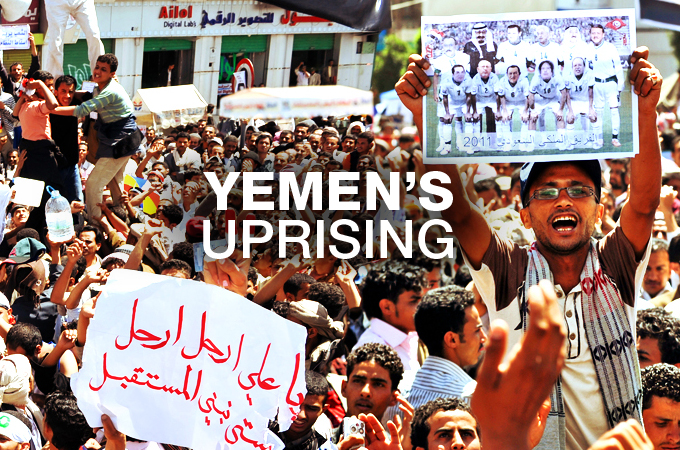Shelling shakes Yemeni capital
Threat of civil war grows as fighting between forces loyal to Ali Abdullah Saleh and tribal fighters spreads from Sanaa.

Heavy explosions have rocked the Yemeni capital, Sanaa, as fighting to topple president Ali Abdullah Saleh threatened to pitch the country into civil war.
Residents reported heavy shelling from outside the city in the early hours on Thursday, targeting residential areas. The crackle of heavy gunfire could be heard in different parts of the city.
“The explosions can be heard across town in the south of Sanaa. This seems to be heavier weapons than the machine guns and the mortars of the past few days,” one resident said.
The fighting follows months of political unrest in Yemen that has already left scores of people dead, and comes after Saleh refused to sign a GCC-brokered exit deal on Sunday that would have brought and end to his decades-long rule.
Clashes between government forces and guards loyal to Sadiq al-Ahmar, head of the Hashed tribal federation, broke out in Sanaa earlier this week.
In the Arhab region, about 32km northwest of Sanaa, a brigade of Saleh’s presidential guard clashed with local tribesmen, indicating that the fighting was spreading outside the capital.
Six government soldiers were killed and 21 injured in that fight, an army official said, speaking on condition of anonymity under military rules. It was unclear if any tribesmen were killed.
So far, 20 government troops and 46 of al-Ahmar’s fighters have been killed – bringing the death toll since Monday to at least 69. Scores more were reported injured.
The fighting has sent dozens of families fleeing Sanaa and seeking refuge outside the capital.
Long lines of cars snaked out of the city, bags piled high on their roofs, even as gunmen blocked entrances to prevent tribesmen from bringing in reinforcements, witnesses said.
‘I am afraid for my life’
Eyewitnesses said that all roads entering Sanaa were blocked by republican guards, who are under the command of Saleh’s son, leaving hundreds of Yemenis trying to enter the capital stranded and forced to spend the night in their cars.
“It’s no longer possible to stay in Sanaa. The confrontations will reach all parts of the city,” said Murad Abdullah as he left by car.
“I am afraid for my life. I will go to my village in Ibb. The situation there is safe.”
Witnesses and officials said al-Ahmar’s supporters controlled several ministry buildings, including the trade and tourism ministries, as well as the offices of the state news agency Saba.
 |
| For more on Yemen, visit our Spotlight page |
Al-Ahmar’s fighters also attacked the main building of the interior ministry, whose courtyard came under fire from rocket-propelled grenades, witnesses said.
Yemen’s interior ministry blamed the tribal fighters for the violence. In a statement, al-Ahmar accused the regime of trying to “ignite discord and civil war between Yemenis.”
Thousands of protesters marched through the capital Wednesday, not far from the clashes, calling on Saleh to step down. Protest leader Mana al-Matari said the marchers remained committed to non-violence and accused Saleh of fuelling the unrest.
In a statement, read by spokesman Ahmed al-Soufi in a meeting with tribal allies, Saleh ruled out a voluntary departure and blasted US-backed efforts to negotiate his exit after 32 years of authoritarian rule.
“I will not leave power and I will not leave Yemen,” the statement said. “I don’t take orders from outside.”
Saleh also threatened that his departure could turn Yemen into a haven for al-Qaeda, playing on US fears, a long-time ally of the Yemeni leader, that the group could extend its influence in the Arabian peninsula country.
“Yemen will not be a failed state. It will not turn into an al-Qaeda refuge,” the statement continued. Saleh also said he would work to prevent the recent violence from “dragging the country into a civil war.”
Pressure has been mounting from various quarters for Saleh to sign the GCC deal, which requires the 65-year-old to step down from office within 30 days, in return for immunity from prosecution.
Barack Obama, the US president, on Wednesday called on Saleh to “immediately” honour his promise to cede power. The United States also ordered all non-essential diplomats and embassy family members to leave Yemen.
Also on Wednesday, UN Secretary-General Ban Ki-moon called for an immediate end to the fighting, expressing concern that clashes “might further destabilise the situation,” UN spokesman Martin Nesirky said at UN headquarters in New York.